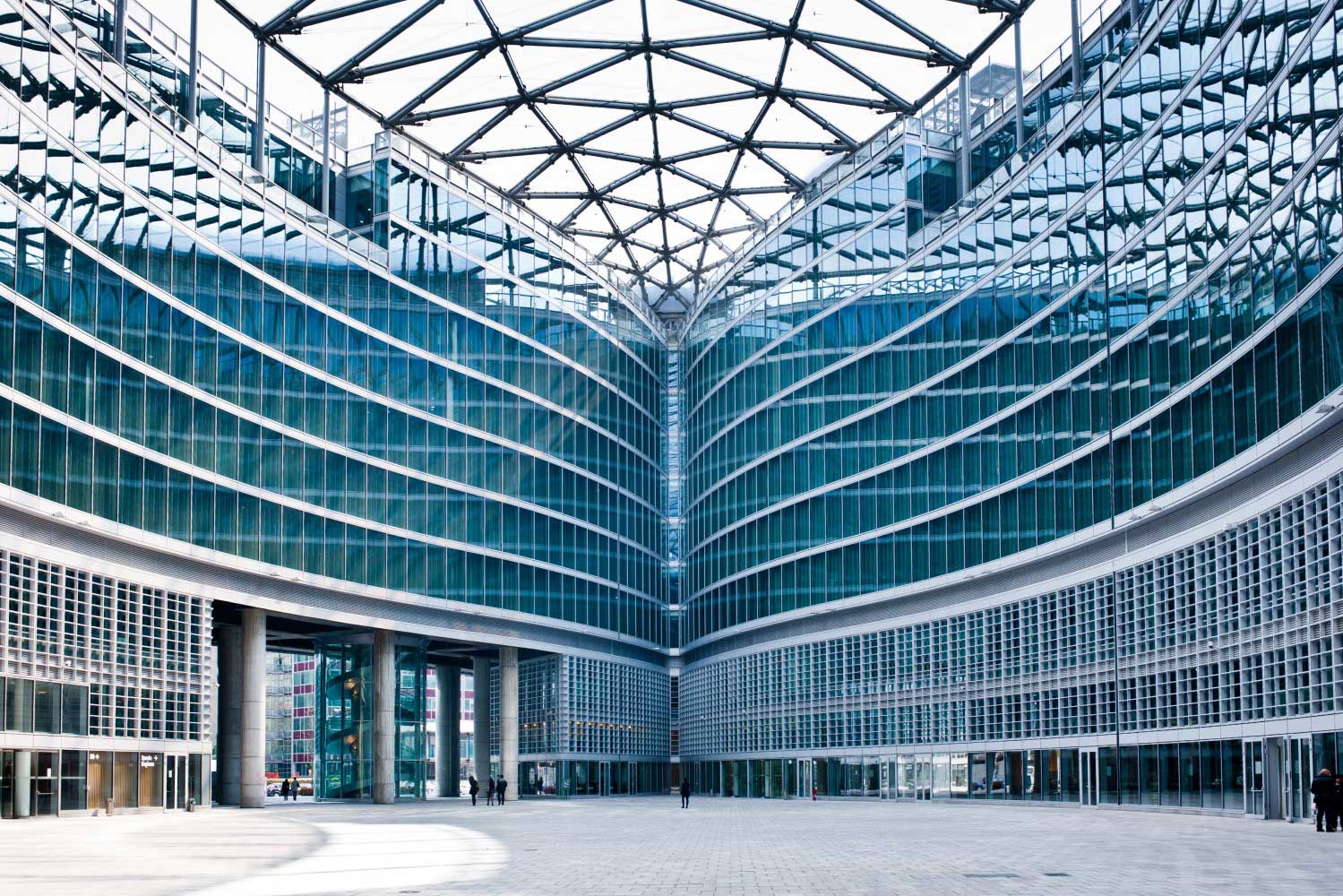Work is central in people’s life. Beyond being people’s main source of livelihood, work holds a collective significance as it can forge social cohesion and give citizens a sense of identity, belonging and purpose.[1] Numerous studies have examined how working conditions, but also voice in the workplace, affect political participation.[2]
Yet today, the world of work is deeply fragmented. Neoliberal policies have increased in-work poverty and generated more precarious forms of employment, while megatrends such as digitalization or the rise of platform work have contributed to undermine traditional forms of organized labour.

The OECD’s 2024 Survey on Drivers of Trust in Public Institutions shows that economic and social well-being is a priority concern for citizens.[3] While 59% of people see inflation as among the most important issues facing their country – by far the most frequently cited concern - 71% of respondents say they are concerned about their household’s finances and economic well-being.
This concern for well-being is important for understanding the declining share of people trusting their government and the shockingly low share of people feeling that the political system lets them have a say (only 30% of respondents across OECD countries). There is compelling evidence that social inequalities have a direct impact on political polarisation, abstention or the rise of populist, simplistic and divisive political offers.[4]
Social dialogue is too rarely considered in the debate about strengthening democracy and improving trust in public institutions. Trade unions are democratic organisations where working people discuss and engage in collective bargaining processes on a wide range of issues important to themselves, to their communities and to societies more broadly. Unions are central to the economic and social fabric of society, to foster social inclusion and ensure more equitable labour market outcomes by representing the interests of workers on a range of issues such as wages, working conditions, gender equality or the protection of the environment.[5]
Social dialogue is also key to tackle the perception that business interests prevail over public interests – an important finding of the OECD Trust Survey - and most importantly, to foster engagement and the development of active citizenship.
As the largest membership-based organisations, trade unions sustain the democratic and participative structures of a society.[6] Unionism has played a central role in many democratic transitions in history, in countries as diverse as South Africa, Poland, and Spain. Chilean trade unions in particular played critical roles in resisting military dictatorship and reconstructing democracy.[7]
This positive and mutually reinforcing relationship between democracy and trade unions also holds true today. Countries that are considered to be more democratic tend to be those with more robust industrial relations systems and with a strong culture of social dialogue.[8] In the US, significantly fewer restrictive voting laws have been passed in states with high union-density than in other states. Conversely, weakening unions (through the enactment of “right-to-work” laws) has proven to have significant long-term political effects, such as lower voter turnout and fewer working-class candidates.[9]
Yet today, workers’ rights to join a union and to collective bargaining are under attack, including in OECD countries. According to the ITUC 2024 Rights Index, about eight in ten countries denied workers the right to bargain collectively and almost nine out of ten violated the right to strike.
Furthermore, trade unions are organising to increase union membership and respond to the fragmentation of the world of work. Throughout the world, trade unions are taking innovative actions to engage with the most vulnerable, the youth, self-employed and informal workers, as well as in new sectors of employment.[10]
Chile provides one excellent example. The Central Unitaria de Trabajadores y Trabajadoras (CUT), the most representative trade union organisation in Chile, has engaged in all democratically established platforms for civil society in the country.
One of the main spaces for tripartite engagement is the Consejo Superior Laboral, where the main representatives of the Government, workers and businesses meet on a regular basis. This space can be considered as a successful example of dialogue and negotiation, leading to important agreements for the construction of public and social policies that address citizens’ main concerns while gathering broad support across the society.
In the framework of this tripartite space, CUT has been able to advance important reforms, with breakthroughs such as the largest increase in minimum wage in the history of Chile, or the law to reduce the working week to 40 hours. It is through the same platform that CUT has successfully promoted the ratification of ILO Convention n°176 on health and safety in mines and ILO Convention n°190 on the elimination of violence and harassment. Dialogue in this tripartite council has led to one of the most important cultural changes in the world of work, including on the fight against gender-based violence, implemented through the landmark Karin law.
The engagement of CUT-Chile shows that as specific actors in participative democracy addressing some of the most pressing challenges faced by people in their day-to-day life, trade unions should be considered as central pillars of democracy. While they are different processes, political democracy and social dialogue mutually reinforce each other.
While they are different processes, political democracy and social dialogue mutually reinforce each other. Looking ahead, we must join forces to demonstrate that they are the best tools to respond to people’s needs and aspirations.
[1] Work for a brighter future, Global Commission on the Future of Work, International Labour Office, Geneva: ILO, 2019
[2] Jian, G., & Jeffres, L. (2008). Spanning the Boundaries of Work: Workplace Participation, Political Efficacy, and Political Involvement. Communication Studies, 59(1), 35–50. https://doi.org/10.1080/10510970701849370 ; Geurkinkhttps B., Akkerman A., and Sluiter R., Political Participation and Workplace Voice: The Spillover of Suppression by Supervisors, Political StudiesVolume 70, Issue 2, May 2022, Pages 327-347, Political Participation and Workplace Voice: The Spillover of Suppression by Supervisors (sagepub.com)
[3] OECD (2024), OECD Survey on Drivers of Trust in Public Institutions – 2024 Results: Building Trust in a Complex Policy Environment, OECD Publishing, Paris, https://doi.org/10.1787/9a20554b-en.
[4] See for instance Gabriel, Ricardo Duque and Klein, Mathias and Pessoa, Ana Sofia, The Political Costs of Austerity (July 1, 2022). Available at http://dx.doi.org/10.2139/ssrn.4160971, See also Dani Rodrik, Annual Review of Economics Why Does Globalization Fuel Populism? Economics, Culture, and the Rise of Right-Wing Populism (19 April, 2021), available at https://drodrik.scholar.harvard.edu/files/dani-rodrik/files/why_does_globalization_fuel_populism.pdf
[5] OECD (2019), Negotiating Our Way Up: Collective Bargaining in a Changing World of Work, OECD Publishing, Paris, https://doi.org/10.1787/1fd2da34-en.
[6] OECD (2022), The Protection and Promotion of Civic Space: Strengthening Alignment with International Standards and Guidance, OECD Publishing, Paris, https://doi.org/10.1787/d234e975-en.
[7] Desafíos del Sindicalismo en los inicios del Siglo XXI”. P. Frías F. Ediciones CLACSO, con el patrocinio de la OIT y la Universidad Central. Santiago. Junio 2008.
[8] OECD (2022), Drivers of Trust in Public Institutions in Norway, OECD Publishing, Paris, https://doi.org/10.1787/81b01318-en, p.111
[9] Economic Policy Institute, Unions are not only good for workers, they’re good for communities and for democracy, 15 December 2021, available at https://files.epi.org/uploads/236748.pdf
[10] International Journal of Labour Research • Volume 11, Issues 1-2 (2022) Trade union revitalization: navigating uncertainty, change and resilience in the world of work.
2024 OECD Global Forum on Building Trust and Reinforcing Democracy
This blog is part of a collection of opinion pieces that showcases diverse perspectives on the new frontiers of citizen participation, from thought leaders and practitioners across national and local government, academia, business, trade unions, and civil society. It offers insights and inspiration for discussions at the 2024 Global Forum on Building Trust and Reinforcing Democracy, and future multidisciplinary work at the OECD.
The Global Forum takes place in Milan, Italy, 21-22 October 2024. Register to follow the discussions online: https://www.oecd-events.org/global-forum-on-democracy/en
This blog article should not be reported as representing the official views of the OECD or of its Member countries. The opinions expressed and arguments employed are those of the authors.



